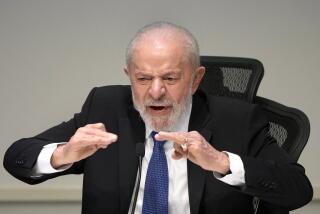Election Losses Shock Brazil’s Ruling Party
- Share via
RIO DE JANEIRO — The Brazilian Democratic Movement party, which helped restore democratic government to Brazil early this year, has suffered rude shocks in its first major electoral test.
In elections Friday in 201 cities, which drew more than 16 million voters, opposition candidates were elected mayor in Brazil’s two biggest cities, Sao Paulo and Rio de Janeiro.
Opposition candidates also won in Porto Alegre and Recife, cities of more than 1 million people.
In Sao Paulo, where 4 million voters cast ballots, the new mayor is Janio Quadros, 69, a former president of Brazil. Nearly 25 years after shocking Brazil by resigning as president, the white-haired Quadros showed he retains electoral magic by defeating Sen. Fernando Henrique Cardoso, who was backed by the Democratic Movement with a multimillion-dollar campaign.
Carnival Atmosphere
In Rio de Janeiro, where 3 million went to the polls, the election as mayor of Saturnino Braga, the candidate backed by Gov. Leonel Brizola, a charismatic opposition leader, unleashed a carnival in the streets as crowds danced to samba bands.
In Recife, the capital of Pernambuco, the political center of the impoverished northeast region, the election was won by Jarbas Vasconcellos, candidate of the Socialist Party.
In Goiania, the capital of Goiaz state, a Democratic Movement stronghold, Darci Accorsi of the Workers Party, which is backed by elements of the Roman Catholic Church, came so close to upsetting the Democratic Movement candidate that a recount has been called.
The results showed a clear shift in the urban electorate toward opposition currents to the left of the Democratic Movement Party, the mainstay of the national government of President Jose Sarney.
Setback for Sarney
Personalities and local issues played a major part in the election, but the results were interpreted by the leftist parties as a vote against Sarney. Under Sarney, inflation has continued at high rates and cities have been deprived of promised funds.
These were the first popular elections since Sarney took office in March. Sarney, who heads a coalition government, tried to remain neutral on the city contests, but he was counting on a big Democratic Movement victory because of the strength of the party’s state organizations.
The Democratic Movement had helped elect the late Tancredo Neves as president in January. Neves died before taking office, and the presidency was assumed by Sarney, his vice presidential running mate.
Sarney has been governing with a Cabinet chosen by Neves, based on a “democratic alliance” between the Democratic Movement and the center-right Liberal Front Party. The Democratic Movement, which holds a majority in Congress, remains Brazil’s largest political party.
Despite the setbacks in Sao Paulo and Rio de Janeiro, Democratic Movement candidates won in at least 14 of the 25 state capitals where mayoralty elections were held.
The movement won in Belo Horizonte, Salvador and Curitiba. But the party’s major goal in the election was the mayoralty of Sao Paulo, the country’s industrial and financial center, which has been the party’s stronghold. The loss to Quadros by a strong Democratic Movement personality such as Cardoso was a major blow.
Opposed to Programs
Quadros was backed by the Liberal Front Party, which broke the governing alliance in Sao Paulo, and by major banking and industrial interests opposed to government programs emphasizing the economic role of state enterprises. Quadros said in a press conference that he was an “intimate friend” of Sarney.
He said Sarney should remain as president until at least 1988, and he said he had no personal desire in making a bid for the presidency himself. “I have already done my military service. The mayoralty will be my last public office,” Quadros said.
But supporters of Gov. Brizola, including the victorious Braga, said the vote showed that Sarney had lost support and called for direct, popular elections of president next year, coinciding with the election of state governors and a constituent assembly.
More to Read
Sign up for Essential California
The most important California stories and recommendations in your inbox every morning.
You may occasionally receive promotional content from the Los Angeles Times.










